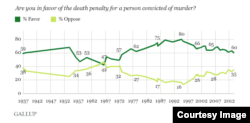Support for the death penalty in the United States is the lowest it has been in 40 years. Still, 60 percent of Americans say they favor the capital punishment for convicted murderers.
The results, published Tuesday in a Gallup poll, show support for the death penalty at its lowest level since 1972.
Gallup has tracked Americans’ views on the death penalty since 1936. Support peaked in 1994, when 80 percent of Americans supported it, but has declined since then.
Gallup said the waning support could be tied to death penalty moratoriums in several states, a trend that started around 2000 when several death-row inmates were proved innocent. Since 2006, six states have repealed the death penalty, including Maryland this year. Currently, 18 states do not allow the death penalty.
According to the Death Penalty Information Center (DPIC), a national non-profit organization “serving the media and the public with analysis and information on issues concerning capital punishment,” the number of executions in the U.S. peaked in the late 90s and has tapered since then.
“This is very much in line with what we’ve been seeing around the country,” said DPIC executive director Richard Dieter, referring to an increase in states that have abolished the death penalty and a drop in death sentencing as well as executions.
Dieter said that while the United States is viewed around the world as a death penalty country, its use is not widespread.
“We recently issued a report that showed two percent of our counties are responsible for the majority of executions since 1976,” he said. “When it comes to applying the death penalty, it’s really a small percentage that’s driving this.”
Capital punishment was suspended in the U.S. from 1972 to 1976, when it was reinstated by the Supreme Court. As of April, there were just over 3,000 inmates on death row, according to the DPIC.
Gallup further identified politics as a major dividing line in how the death penalty is viewed. According to the poll, 81 percent of Republicans currently favor it, compared with 47 percent of Democrats. Independents' 60 percent support matches the national average.
The results, published Tuesday in a Gallup poll, show support for the death penalty at its lowest level since 1972.
Gallup has tracked Americans’ views on the death penalty since 1936. Support peaked in 1994, when 80 percent of Americans supported it, but has declined since then.
Gallup said the waning support could be tied to death penalty moratoriums in several states, a trend that started around 2000 when several death-row inmates were proved innocent. Since 2006, six states have repealed the death penalty, including Maryland this year. Currently, 18 states do not allow the death penalty.
According to the Death Penalty Information Center (DPIC), a national non-profit organization “serving the media and the public with analysis and information on issues concerning capital punishment,” the number of executions in the U.S. peaked in the late 90s and has tapered since then.
“This is very much in line with what we’ve been seeing around the country,” said DPIC executive director Richard Dieter, referring to an increase in states that have abolished the death penalty and a drop in death sentencing as well as executions.
Dieter said that while the United States is viewed around the world as a death penalty country, its use is not widespread.
“We recently issued a report that showed two percent of our counties are responsible for the majority of executions since 1976,” he said. “When it comes to applying the death penalty, it’s really a small percentage that’s driving this.”
Capital punishment was suspended in the U.S. from 1972 to 1976, when it was reinstated by the Supreme Court. As of April, there were just over 3,000 inmates on death row, according to the DPIC.
Gallup further identified politics as a major dividing line in how the death penalty is viewed. According to the poll, 81 percent of Republicans currently favor it, compared with 47 percent of Democrats. Independents' 60 percent support matches the national average.









